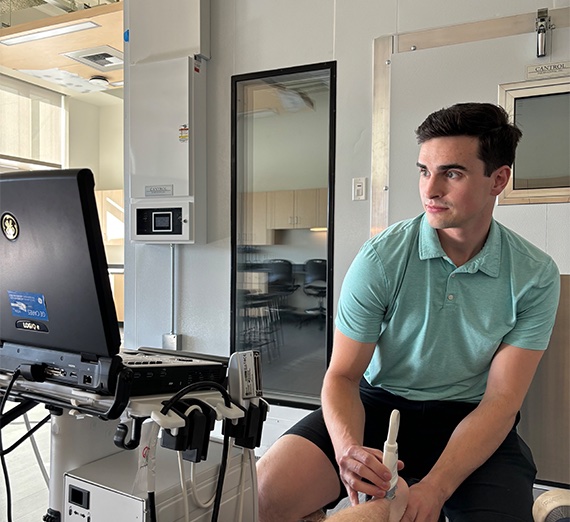Running the Risk

Is there a connection between injuries to runners and global warming?
Through the McKinstry Fellows Research Program – which pairs students and faculty from the University of Washington School of Medicine-Gonzaga University Health Partnership – undergrads from Gonzaga and medical students from the UW sought to answer that question.
Ethan Jones (UWSOM-Spokane) and Christina Garbuz (GU), investigated the effects of a high-heat environment on the Achilles tendons of runners.
Led by Janet Zhang-Lea, assistant professor of Human Physiology at Gonzaga, the study had participants run in two different sessions in a climate-controlled chamber, once in high heat and once at a normal room temperature of 68 degrees.
“With temperatures rising globally, we wanted to learn if we’re likely to see more tendon injuries, or if heat would lessen injuries, or if it would have no effect,” Jones explained. “We used ultrasound to examine the runners' tendons before and after each run and did a follow-up scan within 72 hours.”
In a small-world moment, Jones discovered he’d be working with someone he already knew.
“Christina and I actually attended U-High (University High School in Spokane Valley) together!” he said.
Garbuz, a senior at GU, said she’s always been intrigued by the study of human movement and biomechanics.
“This project combined my interest in biomechanics with another interest – sustainability and climate change,” she said. “That intersection is beautiful.”
She said the UW-GU Health Partnership’s new health science building has been a boon.
The facility opened last fall and houses UWSOM-Spokane and is home to GU’s Human Physiology and a growing number of new health science programs such as public health.
“Working with medical students adds a different perspective to undergrad studies,” said Garbuz. “Ethan’s experience and how he solves problems is different than mine. It’s such a valuable experience.”
She’s also thankful to have been part of this type of research as an undergrad.
“Without the McKinstry fellowship, I wouldn’t have been able to have this experience until grad school.”
Zhang-Lea enjoyed collaborating with the students.
she said. “They each brought different experiences at this stage of their studies.”
Those differences enhanced the project.
“Ethan learned a lot about how to use ultrasound, and Christina put together what she’s learned in her four years of science studies,” said Zhang-Lea. “Ethan honed his clinical skills and bedside manner while communicating with Christina about what medical school is like. It worked out perfectly.”
